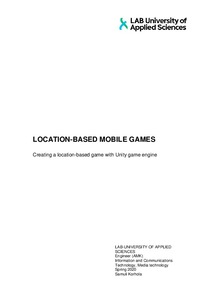Generated procedural environment in Unity
Pascual Pastor, Josep (2023)
Pascual Pastor, Josep
2023
Julkaisun pysyvä osoite on
https://urn.fi/URN:NBN:fi:amk-2023061924166
https://urn.fi/URN:NBN:fi:amk-2023061924166
Tiivistelmä
This thesis investigates game development and procedural generation, focusing on constructing a procedural dungeon generator employing the Unity game engine. The study scrutinizes various procedural generation types and algorithms, delving into their function and implementation intricacies. Simultaneously, it evaluates the benefits and drawbacks of procedural generation, shedding light on its dynamic role in shaping the gaming landscape.
In addition, the thesis explores the attributes of Unity as a game engine, its architecture, and strengths and weaknesses in the context of game development. A comparison with other game engines is also conducted to gauge Unity's relative standing in the field.
The practical component of the study offers a comprehensive account of creating a procedural dungeon generator. It discusses the generation and positioning of dungeon rooms and hallways, culminating in a fully functional dungeon. The findings underscore the considerable advantages of procedural generation, including resource efficiency and increased replayability, despite limitations such as balancing difficulties. Lastly, it identifies Unity as a powerful tool for implementing procedural generation in game development.
In addition, the thesis explores the attributes of Unity as a game engine, its architecture, and strengths and weaknesses in the context of game development. A comparison with other game engines is also conducted to gauge Unity's relative standing in the field.
The practical component of the study offers a comprehensive account of creating a procedural dungeon generator. It discusses the generation and positioning of dungeon rooms and hallways, culminating in a fully functional dungeon. The findings underscore the considerable advantages of procedural generation, including resource efficiency and increased replayability, despite limitations such as balancing difficulties. Lastly, it identifies Unity as a powerful tool for implementing procedural generation in game development.
Kokoelmat
Samankaltainen aineisto
Näytetään aineisto, joilla on samankaltaisia nimekkeitä, tekijöitä tai asiasanoja.
-
Game Development in Unity : Game Production, Game Mechanics and the Effects of Gaming
Dansie, Jason (Metropolia Ammattikorkeakoulu, 2013)The goal of this thesis is to examine how video games are designed and to see how differ-ent game mechanics work and how to use them in the development of a game, as well as examine what are both the positive and negative ... -
Location-based mobile games : creating a location-based game with the Unity game engine
Korhola, Samuli (2020)The subject of this thesis is location-based mobile games. Location-based mobile games are a way for mobile games to combine reality with virtual worlds and thus re-define the gaming experience. This thesis presents ... -
”WE WANT A 3D GAME” : Customer expectations for the games company when buying a serious game
Sorppanen, Mikko (Oulun seudun ammattikorkeakoulu, 2012)All digital games are not used for entertainment. Some of them can also be used for non-entertainment purposes and these games are called serious games. This thesis is carried out in co-operation with one Finnish games ...


